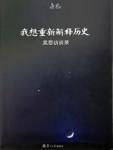Chapter 1 preface
This book includes 29 interviews with me, from 2003 to 2010.The compilation of this book is entirely the idea of Mr. Li Youshun from Fudan University Press.He collected articles, sorted them, and compiled a first draft.On this basis, I added a few articles, deleted a few articles, adjusted the classification, redid the title, and wrote this preface again.
There is definitely something wrong with the classification.If you don't classify, you will grab the eyebrows and beards, which is not convenient for content browsing.If it is classified, almost every interview is comprehensive, with eyebrows, beard and hair, should it be placed in the position of the eyebrows or the position of the beard?There is no other way but, if you have more beards, put them where the beards are, and if you have more eyebrows, put them where the eyebrows are.Maybe there are a few eyebrows that are particularly eye-catching, and even the beard and hair are placed on the eyebrows.
The original titles of the interviews have different styles, and they are all eye-catching.After the forced classification, most of the titles were redone to emphasize the key content, which inevitably damaged the literary talent.In addition, some similar questions and answers appeared many times. I was afraid of annoying readers, so I deleted many of them and damaged the original work.There were some misunderstandings and mistakes in the original work, as well as clerical errors, which I corrected without authorization.For all the above, please excuse the interviewer.Although there are some deletions, there are still some repetitions in each article, and readers are forgiven.
After it was published in 2003, I wrote some articles and sorted out a few speeches, and wanted to publish them in a collection, but I felt thin and not mature enough on the whole.Now that the more immature collection of interviews is published, a few words need to be said to make up for the shortcomings.
A central pillar of the view of history that I am trying to construct is a concept borrowed from behavioral ecology: survival strategies.Gathering, fishing and hunting are survival strategies, and violent plunder is also a survival strategy. Nomadism, farming, workmanship, and business are all survival strategies.The condition for the existence and development of all survival strategies, from single-celled organisms to human occupations, is: income ≧ payment.Above the equation, the higher the cost-to-pay ratio, the greater the development potential, and vice versa.The interaction and evolution of various survival strategy groups, just like the interaction and evolution of different species, forms the balance of the world on the basis of the natural environment-the balance of various survival strategies in human society.In other words, people go up until they are exhausted or the gains outweigh the gains.
This kind of historical view follows the story of biological evolution, tells the evolution of human survival strategies, and pays attention to the relationship between human beings and nature. I call it the historical view of creation.The historical view of blood reward mentioned repeatedly in this book is just a special type of the historical view of good fortune, a theory that describes the changes in the world dominated by violent groups.
It is said in the book that "creating a theory is like building a house", which is true in terms of structure, but not necessarily in terms of process.Before the house was built, the craftsmen had a well-thought-out plan, but I didn't.My feeling is: "The straw sandals don't look good, they look like they are playing".First there are two or three bricks and tiles, and then there are one or two beams and columns. There are too many components accumulated. According to the material, I imagined the appearance of the house, and then built and modified it while accumulating components. It is still under construction.In my imagination, the cultural construction of contemporary China is the same.That being the case, add bricks and tiles, and contribute to great things, if you are immature, you will not be mature.

